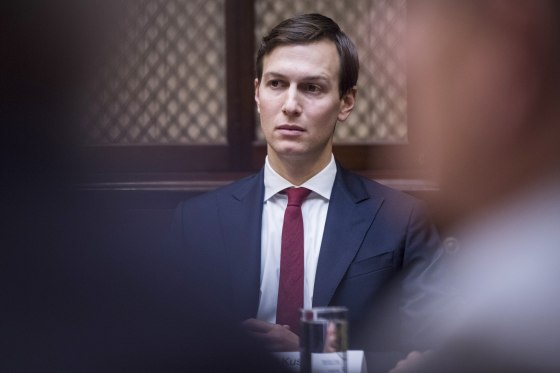White House senior adviser Jared Kushner said Tuesday that special counsel Robert Mueller's investigation was worse for the country than Russian electoral interference, which he downplayed as "a couple of Facebook ads."
Speaking at the Time 100 Summit, Kushner, who is President Donald Trump's son-in-law, was asked repeatedly about Mueller's report, a redacted version of which was released last week.
"You look at what Russia did, buying some Facebook ads to try to sow dissent and do it, and it’s a terrible thing," Kushner said. "But I think the investigations and all of the speculation that’s happened for the last two years has had a much harsher impact on our democracy than a couple of Facebook ads."
"I mean I spent about — I think they said they spent about $160,000 — I spent $160,000 on Facebook every three hours during the campaign," he continued. "So if you look at the magnitude of what they did and what they accomplished, I think the ensuing investigations have been way more harmful to our country."
Shortly after the interview, Trump tweeted praise for Kushner's appearance.
"Great interview by Jared," Trump wrote. "Nice to have extraordinarily smart people serving our Country!"
According to Mueller's redacted report, which covered Russian interference in the 2016 presidential election, whether the Trump campaign colluded with Russia, and whether Trump obstructed justice, Russian Facebook ads reached as many as 126 million people. Mueller cited Facebook for that statistic.
Mueller wrote that the Internet Research Agency, a Kremlin-linked online disinformation firm, began targeting the U.S. as early as 2014 with its social media trolling efforts, which the special counsel wrote were "designed to attract U.S. audiences."
"These groups and accounts, which addressed divisive U.S. political and social issues, falsely claimed to be controlled by U.S. activists," he wrote. "Over time, these social media accounts became a means to reach large U.S. audiences."
"By early to mid-2016, IRA operations included supporting the Trump Campaign and disparaging candidate Hillary Clinton," he added. "The IRA made various expenditures to carry out those activities, including buying political advertisements on social media in the names of U.S. persons and entities. Some IRA employees, posing as U.S. persons and without revealing their Russian association, communicated electronically with individuals associated with the Trump Campaign and with other political activists to seek to coordinate political activities, including the staging of political rallies."
Mueller's investigation did not identify any evidence that U.S. citizens "knowingly or intentionally coordinated" with the Russians who controlled that effort, which included Facebook, Instagram, and Twitter accounts.
Kushner said Tuesday that when the revelations about Russia's election interference surfaced, the Trump campaign didn't see those efforts as effective.
"You can look at it Monday morning quarterback and say, ‘Maybe you should have looked at those times,’" Kushner said. "But I personally think that what happened was is, all these people thought Trump was going to lose. They all predicted Trump was going to lose. They were wrong. The American electorate in this great democratic system chose the opposite. And then I think that instead of saying, ‘Oh wait, we got it wrong,’ they said. ‘Well, maybe it was Russia.’"
Kushner was referred to multiple times in Mueller's report with regard to leads involving a possible Trump-Russia conspiracy — something the special counsel said investigators ultimately could not prove.
Mueller wrote that his probe "established multiple links between Trump Campaign officials and individuals tied to the Russian government" but ultimately "did not establish that the Campaign coordinated or conspired with the Russian government in its election-interference activities."
The report detailed Kushner's meeting with former national security adviser Michael Flynn and Russian ambassador to the U.S. Sergey Kislyak after the 2016 election, and a June 2016 Trump Tower meeting he attended with the president's son, Donald Trump Jr. and then-campaign chairman Paul Manafort, at which a Kremlin-connected lawyer was supposed to provide damaging information on Clinton, the 2016 Democratic presidential nominee, but ultimately did not.

